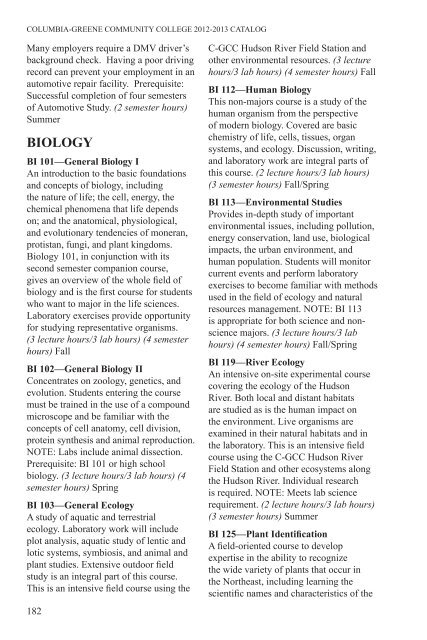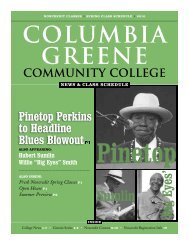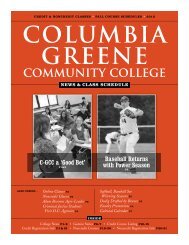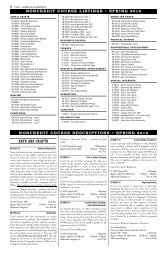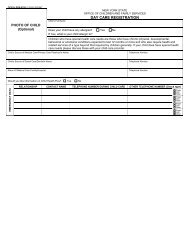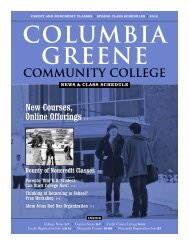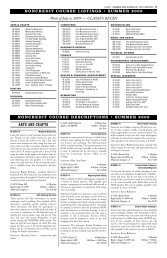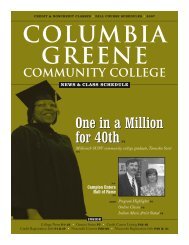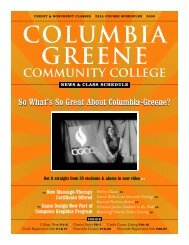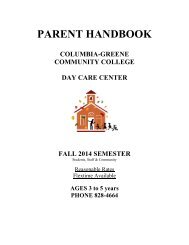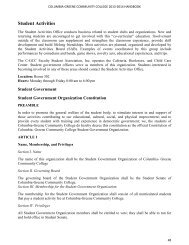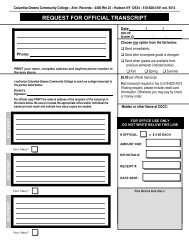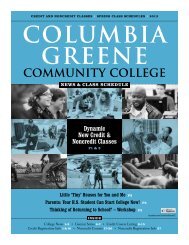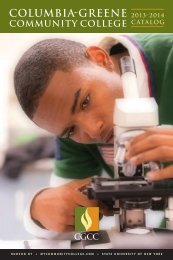Current C-GCC Catalog - Columbia-Greene Community College
Current C-GCC Catalog - Columbia-Greene Community College
Current C-GCC Catalog - Columbia-Greene Community College
You also want an ePaper? Increase the reach of your titles
YUMPU automatically turns print PDFs into web optimized ePapers that Google loves.
COLUMBIA-GREENE COMMUNITY COLLEGE 2012-2013 CATALOG<br />
Many employers require a DMV driver’s<br />
background check. Having a poor driving<br />
record can prevent your employment in an<br />
automotive repair facility. Prerequisite:<br />
Successful completion of four semesters<br />
of Automotive Study. (2 semester hours)<br />
Summer<br />
BioLoGY<br />
Bi 101—General Biology i<br />
An introduction to the basic foundations<br />
and concepts of biology, including<br />
the nature of life; the cell, energy, the<br />
chemical phenomena that life depends<br />
on; and the anatomical, physiological,<br />
and evolutionary tendencies of moneran,<br />
protistan, fungi, and plant kingdoms.<br />
Biology 101, in conjunction with its<br />
second semester companion course,<br />
gives an overview of the whole feld of<br />
biology and is the frst course for students<br />
who want to major in the life sciences.<br />
Laboratory exercises provide opportunity<br />
for studying representative organisms.<br />
(3 lecture hours/3 lab hours) (4 semester<br />
hours) Fall<br />
Bi 102—General Biology ii<br />
Concentrates on zoology, genetics, and<br />
evolution. Students entering the course<br />
must be trained in the use of a compound<br />
microscope and be familiar with the<br />
concepts of cell anatomy, cell division,<br />
protein synthesis and animal reproduction.<br />
NOTE: Labs include animal dissection.<br />
Prerequisite: BI 101 or high school<br />
biology. (3 lecture hours/3 lab hours) (4<br />
semester hours) Spring<br />
Bi 103—General ecology<br />
A study of aquatic and terrestrial<br />
ecology. Laboratory work will include<br />
plot analysis, aquatic study of lentic and<br />
lotic systems, symbiosis, and animal and<br />
plant studies. Extensive outdoor feld<br />
study is an integral part of this course.<br />
This is an intensive feld course using the<br />
182<br />
C-<strong>GCC</strong> Hudson River Field Station and<br />
other environmental resources. (3 lecture<br />
hours/3 lab hours) (4 semester hours) Fall<br />
Bi 112—Human Biology<br />
This non-majors course is a study of the<br />
human organism from the perspective<br />
of modern biology. Covered are basic<br />
chemistry of life, cells, tissues, organ<br />
systems, and ecology. Discussion, writing,<br />
and laboratory work are integral parts of<br />
this course. (2 lecture hours/3 lab hours)<br />
(3 semester hours) Fall/Spring<br />
Bi 113—environmental studies<br />
Provides in-depth study of important<br />
environmental issues, including pollution,<br />
energy conservation, land use, biological<br />
impacts, the urban environment, and<br />
human population. Students will monitor<br />
current events and perform laboratory<br />
exercises to become familiar with methods<br />
used in the feld of ecology and natural<br />
resources management. NOTE: BI 113<br />
is appropriate for both science and nonscience<br />
majors. (3 lecture hours/3 lab<br />
hours) (4 semester hours) Fall/Spring<br />
Bi 119—river Ecology<br />
An intensive on-site experimental course<br />
covering the ecology of the Hudson<br />
River. Both local and distant habitats<br />
are studied as is the human impact on<br />
the environment. Live organisms are<br />
examined in their natural habitats and in<br />
the laboratory. This is an intensive feld<br />
course using the C-<strong>GCC</strong> Hudson River<br />
Field Station and other ecosystems along<br />
the Hudson River. Individual research<br />
is required. NOTE: Meets lab science<br />
requirement. (2 lecture hours/3 lab hours)<br />
(3 semester hours) Summer<br />
Bi 125—Plant identifcation<br />
A feld-oriented course to develop<br />
expertise in the ability to recognize<br />
the wide variety of plants that occur in<br />
the Northeast, including learning the<br />
scientifc names and characteristics of the


